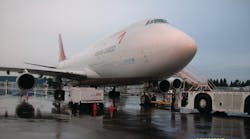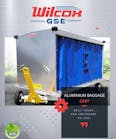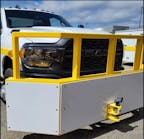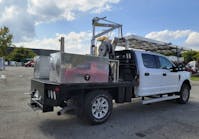I had the opportunity to visit our Phoenix facility recently to inspect equipment. Our operation at this location is relatively small, but busy and its equipment gets a real work out.
As I walked through the facility, I noticed a shelf holding a container full of caster pallet dolly stops. My inspection preceded uneventfully, only some minor tug oil leaks and a K-Loader that needed some wiring repairs and a coat of paint.
When we reached the pallet dollies, I asked about the shelf full of stops I’d seen earlier. The terminal supervisor informed me the retain pin at the back of the stop, often sheared and forced him to replace the whole stop.
I immediately went into mechanic mode and went back to get a closer look at the broken stops on the shelf. After a short time inspecting the pallet locks, I could see that the locating pins that sheared were steel pins inserted into a drilled-out hole.
We discussed the cost of replacing the stops and the “obvious” possibility of just having the pins manufactured and installed by a machine shop. Needless to say this was going to quickly become a big GSE maintenance savings.
MECHANICAL MENTALITY
But what really makes me recount this story was the fact that it took my visit to bring up the possibility. It struck me that mechanics just think differently when looking at broken equipment. We’re always looking at things in terms of “how can we fix it” – especially in the GSE arena, where downed equipment can seriously affect daily schedules and R&M expenses have to be watched like a hawk.
Not too long ago I was asked to inspect a used Stewart & Stevenson push back tractor for possible purchase. The unit was indeed a “late model” and hadn’t been well maintained. But the price was right!
I spoke to the sales representative extensively to get as much history on the unit as I could. We than took it out for a test drive around the field, checking the operation of both steering systems and other components. I quickly came to the conclusion that we could “fix” this unit well within our budget and produce a reliable piece of equipment. Again, the mechanic mind set paid off for my employer.
When I’m working with ground service maintenance outfits I often use this way of looking at mechanical aptitude to size up a contractor. Before discussing the very pertinent details such as costs, experience and availability, I like to ask about what sorts of repairs are currently on the schedule.
I’m looking for repair thoughts that are outside the box. Not just someone who can replace parts, but a GES outfit that really has the ability to fix and improve our equipment.
The best GSE mechanics not only are able to quickly determine the cause of the issue, but also can see the best way to repair a failure in order to prevent that failure from happening again. And he is even able to conduct a routine service while “looking” at the equipment for a more efficient way of accomplishing the service next time.
It’s this way of looking at repair and maintenance that any organization has to find in its repair team in order to succeed in today’s ever-tightening airport operation margins.
The days of GSE maintenance shooting from the hip are behind us. We need to assure all our R&M is conducted by the most efficient and cost-effective contractors or mechanics who also have the ability to respond in ways beyond just repacking parts.
As our equipment becomes more complex, we sometimes forget to look for the more abstract mechanical ability that goes way past anything that simple training can teach. The people conducting our repairs and services must be true mechanics who can meet our daily up time requirements by more than just replacing parts. I know it’s not always easy to find these true mechanics but my experience tells me they are out there. We just need to know what to look for.
About the author: Chris Fernandez started working as an aircraft tech for United Airlines and over the course of almost 20 years with the airline conducted C checks, wide-body overhaul, special projects and GSE maintenance. He is currently in charge of both GSE maintenance for Flight Extenders and fleet maintenance for Matheson Trucking.






